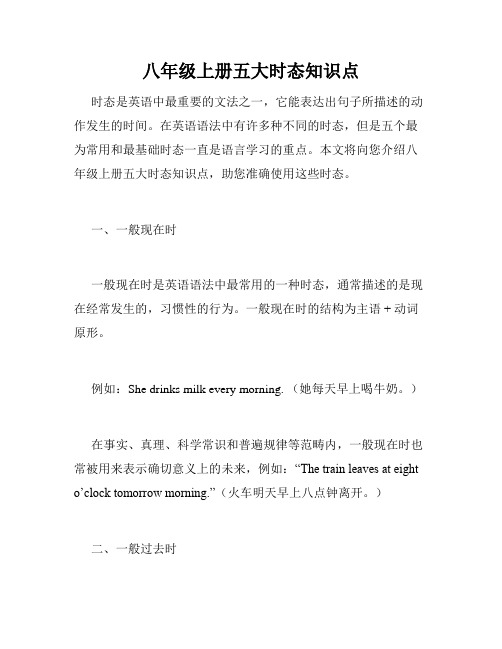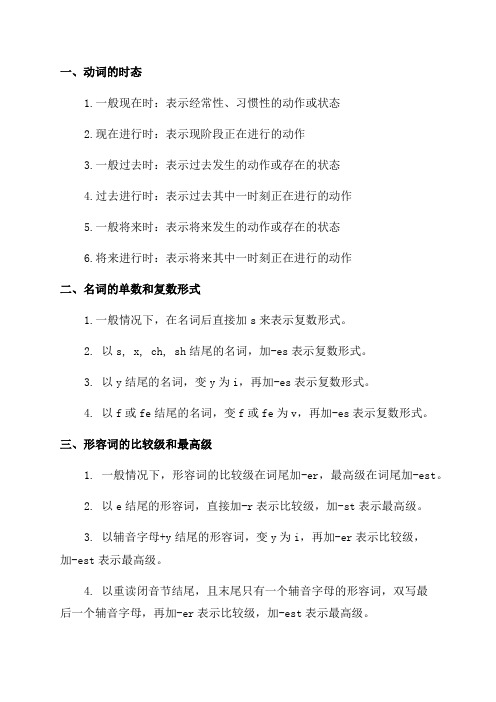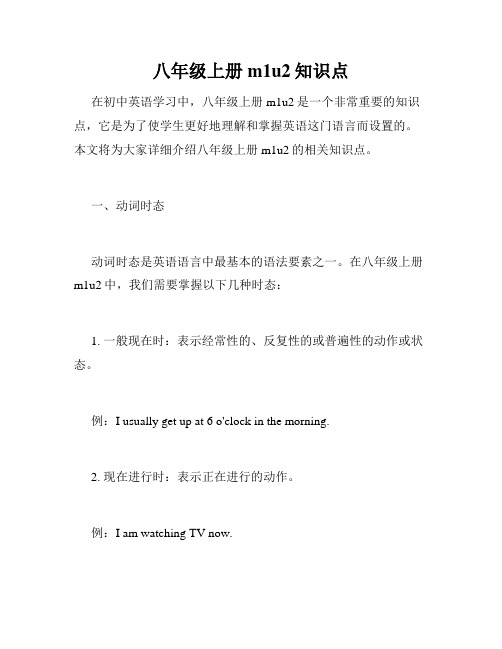八年级英语上册时态复习
八年级上册五大时态知识点

八年级上册五大时态知识点时态是英语中最重要的文法之一,它能表达出句子所描述的动作发生的时间。
在英语语法中有许多种不同的时态,但是五个最为常用和最基础时态一直是语言学习的重点。
本文将向您介绍八年级上册五大时态知识点,助您准确使用这些时态。
一、一般现在时一般现在时是英语语法中最常用的一种时态,通常描述的是现在经常发生的,习惯性的行为。
一般现在时的结构为主语 + 动词原形。
例如:She drinks milk every morning. (她每天早上喝牛奶。
)在事实、真理、科学常识和普遍规律等范畴内,一般现在时也常被用来表示确切意义上的未来,例如:“The train leaves at eight o’clock tomorrow morning.”(火车明天早上八点钟离开。
)二、一般过去时一般过去时用于过去完成的动作或状态,它可以与过去的时间连用,也可以与一段英语中的已知或者同时提供的信息联系起来。
一般过去时的结构为主语 + 动词的过去式。
例如:I went to the supermarket yesterday. (我昨天去了超市。
)在过去描述的事件或者经历中,一般过去时是最适合的时态。
比如把新闻内容翻译成英文时,用到的就是一般过去时。
三、现在进行时现在进行时用于描述当前正在发生或进行的事情,是与现在紧密相关的一种时态。
现在进行时的结构为主语 + am / is / are + 动词的 -ing 形式。
例如:I am drinking tea at the moment. (我此刻正在喝茶。
)现在进行时可以体现出动作的临时性和正在进行态的状态。
当指代当前正在进行的动作时,它是最适合的时态,特别是在描述美食、追剧等活动时使用较多。
四、过去进行时过去进行时用于描述过去某个时间段正在进行的事情,经常用于强调过去某个时刻正在进行的某一个动作。
过去进行时的结构为主语 + was / were + 动词的 -ing 形式。
八年级英语知识点

一、动词的时态1.一般现在时:表示经常性、习惯性的动作或状态2.现在进行时:表示现阶段正在进行的动作3.一般过去时:表示过去发生的动作或存在的状态4.过去进行时:表示过去其中一时刻正在进行的动作5.一般将来时:表示将来发生的动作或存在的状态6.将来进行时:表示将来其中一时刻正在进行的动作二、名词的单数和复数形式1.一般情况下,在名词后直接加s来表示复数形式。
2. 以s, x, ch, sh结尾的名词,加-es表示复数形式。
3. 以y结尾的名词,变y为i,再加-es表示复数形式。
4. 以f或fe结尾的名词,变f或fe为v,再加-es表示复数形式。
三、形容词的比较级和最高级1. 一般情况下,形容词的比较级在词尾加-er,最高级在词尾加-est。
2. 以e结尾的形容词,直接加-r表示比较级,加-st表示最高级。
3. 以辅音字母+y结尾的形容词,变y为i,再加-er表示比较级,加-est表示最高级。
4. 以重读闭音节结尾,且末尾只有一个辅音字母的形容词,双写最后一个辅音字母,再加-er表示比较级,加-est表示最高级。
四、副词的比较级和最高级1. 一般情况下,副词的比较级在词尾加-er,最高级在词尾加-est。
2. 以e结尾的副词,直接加-r表示比较级,加-st表示最高级。
3. 以辅音字母+y结尾的副词,变y为i,再加-er表示比较级,加-est表示最高级。
4. 以重读闭音节结尾,且末尾只有一个辅音字母的副词,双写最后一个辅音字母,再加-er表示比较级,加-est表示最高级。
五、情态动词情态动词是表示说话人的情态或态度的一类助动词,如can, could, may, might, must, shall, should, will, would, 以及need, ought等。
它们后面加动词原形。
六、直接引语和间接引语的转换1.直接引语是指直接引用他人的原话。
转述别人说的话时,可以采用间接引语,即将对方的原话进行转述。
八年级上册英语u1语法知识点

八年级上册英语u1语法知识点英语语法对于学习英语而言是非常重要的一部分,尤其是对于初中学生来说,掌握语法知识点是很有必要的。
本文将重点介绍八年级上册英语U1中的一些常用语法知识点,帮助大家更好地学习英语。
一、动词时态动词时态是英语语法中最基本也是最常用的部分,对于初学者来说掌握好动词时态是至关重要的。
在U1中,出现了以下几种时态:一般现在时、一般过去时、现在进行时。
这里我们分别来介绍一下。
1. 一般现在时一般现在时表示的是现在的状态或习惯动作,通常使用“主语+谓语动词的原形”构成,如:- I play basketball with my friends after school.(我放学后和我的朋友们打篮球。
)- She usually goes to school by bus.(她通常乘公交车去上学。
)2. 一般过去时一般过去时表示过去的状态或动作,通常使用“主语+谓语动词的过去式”构成,如:- Yesterday, I went to the park with my family.(昨天,我和我的家人去了公园。
)- He studied hard for the exam last night.(他昨晚为考试努力学习。
)3. 现在进行时现在进行时表示现在正在进行的动作,通常使用“主语+be动词+现在分词”构成,如:- They are playing basketball on the playground.(他们正在操场上打篮球。
)- I am studying for the English test now.(我正在准备英语考试。
)二、情态动词情态动词在英语语法中也是比较重要的一部分,它是用来表示说话者对某一行为的态度、意愿或可能性的动词。
在U1中,主要涉及到以下几个情态动词:can、could、may、might、must、should、would。
这里我们分别来介绍一下。
1. can和couldcan和could都表示能力和可能性。
八年级上册m1u2知识点

八年级上册m1u2知识点在初中英语学习中,八年级上册m1u2是一个非常重要的知识点,它是为了使学生更好地理解和掌握英语这门语言而设置的。
本文将为大家详细介绍八年级上册m1u2的相关知识点。
一、动词时态动词时态是英语语言中最基本的语法要素之一。
在八年级上册m1u2中,我们需要掌握以下几种时态:1. 一般现在时:表示经常性的、反复性的或普遍性的动作或状态。
例:I usually get up at 6 o'clock in the morning.2. 现在进行时:表示正在进行的动作。
例:I am watching TV now.3. 一般过去时:表示过去某个时间发生的动作或状态。
例:I ate breakfast at 7 o'clock this morning.4. 过去进行时:表示过去某个时刻正在进行的动作。
例:I was watching TV at 8 o'clock last night.5. 一般将来时:表示将来要发生的动作或状态。
例:I will go to Beijing next month.二、动词时态的被动语态动词时态的被动语态是英语语言中非常重要的一部分。
在八年级上册m1u2中,我们需要掌握以下几种被动语态:1. 一般现在时的被动语态:am/is/are + 过去分词。
例:The flowers are watered by me every day.2. 现在进行时的被动语态:am/is/are + being + 过去分词。
例:The book is being read by me now.3. 一般过去时的被动语态:was/were + 过去分词。
例:The cake was made by my mother yesterday.4. 过去进行时的被动语态:was/were + being + 过去分词。
例:The car was being repaired by my father when I came back home.5. 一般将来时的被动语态:will be + 过去分词。
人教版八年级英语上册知识点总结

人教版八年级英语上册知识点总结一、基本语法1.时态:英语时态分为以下几种:现在时、过去时、将来时。
每种时态又分为简单时态、进行时态、完成时态和完成进行时态等。
例如:–现在时:简单现在时: 主语 + 动词原形;进行现在时:主语 + be(am/is/are) + v-ing;完成现在时:主语 + have / has + 过去分词;完成进行现在时:主语 + have / has + been + v-ing。
–过去时:简单过去时:主语 + 动词过去式;进行过去时:主语 + was / were + v-ing;完成过去时:主语 + had + 过去分词;完成进行过去时:主语 + had + been + v-ing。
–将来时:简单将来时:主语 + will / shall + 动词原形;进行将来时:主语 + will / shall + be + v-ing;完成将来时:主语 + will / shall + have + 过去分词;完成进行将来时:主语 + will / shall + have + been + v-ing。
2.倒装句:倒装是指把谓语动词放在主语前面形成的一种语法现象。
如:Only in this way can we solve the problem. (只有这样才能解决问题。
) 倒装句句型格式为:_____+主语(名词或代词)+_____。
在不同的情况下需要用到不同的“辅助动词/助动词”来进行倒装。
3.被动语态:被动语态就是在句子中表达动作的承受者(即主语)的语态。
结构为:被(或受)动责任的动词(to be) + 过去分词。
如:The book was written by him.(这本书是由他写的。
)4.虚拟语气:虚拟语气是指在表示假设,愿望,建议等语气时所使用的一种语态形式。
其结构为:主语+should/could/might/would+(have)+动词原形。
如: If I were you, I would buy this dress(如果我是你,我会买这件衣服。
初二上册英语时态复习题

初二上册英语时态复习题一、选择题1.I ___________ to the party last night, but I had to study for the test.a)went b) am going c) will go d) have gone2.She _________ in the park every morning.a)walks b) walked c) is walking d) will walk3.By the time he arrives, we _______ for an hour.a)will wait b) are waiting c) have been waiting d) have waited4.They _________ to the beach last summer.a)go b) went c) are going d) have gone5.We _________ a movie tomorrow evening.a)watch b) watched c) are watching d) will watch6.She _________ to Paris next week.a)fly b) flew c) is flying d) will fly7.He _________ the dishes when I arrived home.a)washed b) washes c) is washing d) was washing8.The sun _________ in the east.a)rises b) rose c) is rising d) will rise9.I _________ my homework yesterday.a)finish b) finished c) am finishing d) will finish10.They _________ married next month.a)get b) got c) are getting d) will get二、用适当的时态填空1.We _______ (visit) our grandparents next weekend.2.Susan _______ (study) for her exams right now.3.The train _______ (leave) in five minutes. Hurry up!4.They _______ (watch) a movie last night.5.By this time tomorrow, I _______ (finish) writing my report.6.He _______ (play) tennis every Sunday.7.We _______ (not go) to the party last week because we were busy.8.I _______ (not see) him since last month.9.The teacher _______ (explain) the lesson at the moment.10.I _______ (not eat) anything since morning.三、改错题1.They goes to school by bus every day.2.She don’t like chocolate cake.3.He is play soccer with his friends now.4.We will going to the movies tomorrow.5.My brother doesn’t went to work yesterday.四、根据句意,用括号中所给动词的适当形式填空1.I usually _______ (get) up at 7 o’clock in the morning.2.They _______ (not play) basketball yesterday.3.She _______ (not watch) TV every day.4.He _______ (read) a book at the moment.5.We _______ (not go) to the park last weekend.6.The teacher _______ (teach) English every Monday.7.They _______ (not swim) in the pool yesterday.8.He _______ (do) his homework right now.9.My mom _______ (cook) dinner in the kitchen.10.The dog _______ (bark) loudly outside.五、根据汉语意思完成句子1.我们明天去看电影。
八年级上册知识点和时态复习

八年级上册知识点复习Module 1 How to learn English1.practise doing sth. 练习做某事2. study plan学习计划3. a number of +可数名词复数+V(复数):许多、很多the number of+可数名词复数+V(单数):……的数量4.advice建议paper纸(都是不可数名词)a piece of advice一条建议 a piece of paper 一张纸three pieces of paper 三张纸5. give sb. some advice给某人一些建议advise sb. to do sth. 建议某人去做某事write it / them down把它(它们)写下来6. What else? 还有什么其它的?7. It is adj.(形容词)+for sb. to do sth. (对某人来说)做某事怎么样It is difficult for old people to learn English well. 对于老年人来说学习英语很难。
It is adj. (形容词)+ (of sb.) to do sth. 某人做某事某人怎么样It is very kind of you to help me. 你能帮我你真好。
(以上动词不定式短语在句中作真正主语,It 是形式主语)8.It is a good idea\way to do sth. 做某事时个好主意(好方法)。
9.this term这学期last term上学期next term下学期10.help sb. (to)do sth. help sb. with sth. 帮助某人做某事11.ask for advice征求意见basic questions基本问题12.spend cost take pay 表示“花费”的区别:人(作主语)+spend on sth.人(作主语)+spend (in) doing sth. 某人花费时间做某事物(作主语)+cost (花某人多少钱)It takes sb. some time to do sth. 花某人多少时间去做某事人(作主语)+pay for(付钱、花钱)13.the meaning of……的意思14. try to do sth. 尝试做某事15.talk\speak to sb.与某人谈话16. write to sb. 写信给某人17.start a conversation开始一段谈话18.talk about sth. with sb.跟某人谈论某事19.as much\many as possible尽可能多地Let’s sp eak English as much as possible.Let’s find out what else we can do to save as many animals as possible.20. much 修饰不可数名词many 修饰可数名词21.make mistakes \make a mistake 犯错误22.listen to听…后接听的对象,listen for 注意听,倾心听23.a way to do sth\ (good )ways to do sth. 做某事的(好)方法24. several times 几次25. What’s happening? 发生什么事?What happens to sb?=What’s wrong with sb.= What’s the matter with sb.某人发生什么事?26.something new\old\interesting 新\旧\有趣的东西\事情。
英语人教版八年级上册时态

1一般现在时态:表示经常或者反复发生的动作。 every day .often, usually, always, on Sundays 肯定句:非三单 +动词原形 三单+ 动词s/es 否定句: 非三单+ don’t 动词原形 三单+ doesn’t 动词原形 问句: Do +非三单 + 动词原形? Does +三单+ 动词原形? 2、一般过去时态: 表示过去发生的动作。 Yesterday, last week, two days ago 肯定句: 主语 + 动词过去式 否定句: 主语+ didn’t 动词原形
• • • • • • • •
3、一般将来时态: 表示将要发生的动作。 tomorrow, next week, in two days 肯定句: 主语+will +动词原形 主语+ be going to + 动词原形 一般疑问句: Will + 主语 + 动词原形? Be + 主语 + going to + 动词原形? 否定句: 主语+ will not (won’t) + 动词原形 主语+ be (is am are)not going to + 动词原 形
plays • 1.Tom _____(play) basketball every day. cleaned • 2. They ________(clean) the classroom yesterday. Will see • 3. ______ you ______(see) the film next week? have seen • 4.I ___________( see) the film already. did see • What _______you ______it ? doesn't read 5. She _________(not read) English every morning. Has he _______(read) read • 6. _____ the book yet? haven't finished (not finish) homework yet. 7.We __________ won't ride • 8.Bob ________(not ride) his bike tomorrow. are tak_(take) photos. • 10.When her mother came back, she was doing _________(do) homework.
- 1、下载文档前请自行甄别文档内容的完整性,平台不提供额外的编辑、内容补充、找答案等附加服务。
- 2、"仅部分预览"的文档,不可在线预览部分如存在完整性等问题,可反馈申请退款(可完整预览的文档不适用该条件!)。
- 3、如文档侵犯您的权益,请联系客服反馈,我们会尽快为您处理(人工客服工作时间:9:00-18:30)。
语法专项II动词一. 动词是表示动作或处于某种状态的词,它分为行为动词,系动词、助动词和情态动词,动词种类多,变化又复杂,是学习英语的难点之一,下面根据动词的特点进行归类,并提供一些辨别方法,以便于理解和掌握。
1. 行为动词在动词中数量最多,它含有实在的意义(又叫实义动词),表示动作或状态,在句中可以单独作谓语,行为动词又分为及物动词和不及物动词,及物动词后面必须加宾语,意义才完整,不及物动词后面不能直接带宾语,常需要在宾语前加介词才能带宾语。
eg:We study English very hard.She has a book in her hand.The sun rises in the east.2. 连系动词本身有一定词义,但不能独立作谓语,必须与表语一起构成谓语,常见的连系动词有:be, look, sound, get, become 等。
eg:My parents are both farmers.The milk tastes terrible.The song sounds good.3. 助动词本身无词义,不能独立作谓语,必须和主要动词构成谓语,表示疑问,否定,时态或其它语法形式。
常见的助动词有:be, have, do, will, shall 等。
eg:Do you have a brother?Have you got an English-Chinese dictionary?I didn ' t go to the cinema yesterday.4. 情态动词本身有词义,但不能独立作谓语,只能和主要动词一起构成谓语,表示说话者的语气和情态,情态动词没有人称和数的变化,情态动词本身可以构成疑问和否定,常见的情态动词有:can, may, must, will, shall, need 等。
eg: Can you sing the English song?Everyone must get to school on time.二. 动词的时态:(一)时态概述:作谓语的动词用来表示动作(情况)发生时间的各种形式称为时态,英语中的时态,就是通过特殊的动词词尾或加一些相关的助动词be, have (has)等,用来表示动作或事件发生的不同时间和方面。
eg: He reads newspapers every day.He read the newspaper yesterday.He is going to read the newspaper tomorrow.(二)一般现在时:1.动词变化:一般现在时主要用动词原形表示,但第三人称单数后要加词尾-s,另外be和have有特殊的人称形式。
、十2. 一般现在时主要表示:(1 )经常性或习惯性的动作,常与这样的时间状语连用:always, ofte n, usually, sometimes 等eg: We always help each other.It ofte n snows in win ter.I get up early every morning.(2)表示主语现在的特征、性格、能力等。
eg: He loves sports.Jane is an outgo ing girl.Tom and Tim both have medium height.(3 )表示客观、普遍真理eg:Two and four makes six.Water boils at 100 CThe moon moves round the earth.3. 一般现在时的疑问句一般以在句首加助动词do, does的方式构成。
第三人称单数加does,其他加do,这时动词一概用原形;动词be只需与主语位置对调就行了。
eg: Do you like En glish?Do they have story books?What does she do every evening?Is she at home? Are you good at English? 4. 一般现在时的否定式是 do not ( don ' t )或 does not ( doesn ' t )+动词原形来 构成的,be 动词做谓语动词只需在 be 后加 not 构成否定。
eg:I don ' t like oranges at all.She doesn ' t work in the TV station. They aren ' t students. I ' m not busy every weekend. 三 . 现在进行时:1. 动词变化:现在进行时由“ am/is /are +动词现在分词”构成。
加 -ing 的规则如下: ( 1)一般在动词原形末尾加 -ing 。
如: stay -staying listen - listening work -working look -looking (2)以不发音的字母 make -making give -giving please - pleasing close- closing(3)以一个辅音字母结尾的重读闭音节词,先双写这个辅音字母,再加 put -puttingsit - sitting run - running begin - beginning 2.现在进行时的用法( 1)表示说话时正在进行或发生的动作,这时可以不用时间状语,也可以和 now, atpresent, at the moment 等时间状语连用。
有时用一个动词,女口 look (看),listen (听)。
eg: What are you reading now?Listen! Someone is singing in the classroom.( 2)表示当前一段时期的活动或现阶段正在进行的动作。
eg: They are working in a factory these days. More and more people are giving up smoking. ( 3)表示最近按计划或安排要进行的动作。
现在进行时有时可表示一个在最近按计划或安排要进行的动作, 时。
eg: When are you leaving? Are you going to Tibet tomorrow?do -doing suffer - suffering spend - spendinge 结尾的动词,先去掉 e ,再加-ing 。
如: take - takingride -ridingrefuse - refusing operate - operating -ing 。
如:win - winning即可以用来代替将来3. 现在进行时的否定句和疑问句比较简单。
否定句在疑问be( am, is, are )后面力口not ;句把be动词移到主语前。
eg:I am not work ing.What are you readi ng now?How are you feeli ng today?The train isn ' t arriving soon.四.一般过去时:2. 一般过去时的基本用法:(1)带有确定的过去时间状语时,要用过去时。
( eg: yesterday, last year, justnow, two days ago, in the old days 等)eg: He left just now.Lei Feng was a good soldier.What did you have for breakfast this morning?(2)表示过去某一段时间内经常或反复发生的动作,这时常和表示频度的状语连用。
eg: Last term we ofte n did experime nts.He always went to work by bus.五.be going to 表示一般将来1. 用法:表示现在打算在最近或将来要做的事,或表示说话人根据已有的迹象认为很有可能要发生的事情,be随着人称的变化变成(am, is, are )eg: We are going to have a new subject this year.It ' s going to rain this after noon.I ' m going to be a pilot when I grow up.2. be going to 的否定句在be动词后加上not ;be going to 的疑问句把be动词移到主语前。
eg:He isn ' t going to see his brother tomorrow.I ' m not going to tell you about it.Who s going to use it?Is your sister going to bring your lun ch?What are you going to do n ext Sun day.【模拟试题】(答题时间:70分钟)一.改错:例1: The rose dark red. The rose is dark red.1. He very likes swim ming.2. He can helps you.3. We haven ' t a good time.4. What are you do after school every day?5. Sometimes I listen music. sometimes I play outside.6. The fish smells not good.7. We should buy some chicken. There are little left.8. There have many birds in the sky.9. My mother ' s glasses is broken.10. A pair of shoes are n early one thousa nd.11. What colour are her hair?12. Does he his homework?13. A: Do you like your class?B: Yes. I like.14. He always do his shopping on Friday evening.15. I very sorry I forgot your birthday.16. I have no brother and sister.二. 连词组句:1. listen, morning, the, to, I, radio, the, in, often2. of, men, nurses, good, sick, hospital, care, in, take, the3. weekdays, he, the, goes, cinema, never, during, the, to4. computer, got, new, you, a, have?5. weekends, he, rest, does, a, got, have, on?6. good, Li Ming, do, and, often, I deeds7. museum, they, the, often, science, visit, how, do?8. the, in, any, there, kitchen, food, is?9. homework, does, day, when, Tom, his, every, where, and, do?10. a, there, vegetables, many, but, apples , aren 't, lot, there, of, are, there三. 用括号里的动词的适当形式填空:1. There (be)_______some glasses on it.2. He (go) ______ to the park every day.3. My uncle (live )____ in Nanjing now.4. ____ Lucy and Lily (like )______ China?5. Li Lei (not like )__________ to drink orange soda.6. The girl (go) ________ home at 4:30 in the afternoon.7. ____ Kate (speak ) _____ French? Yes, she does.8. Jim (not ride )________ his bike often.9. If he (be) ______free tomorrow, he (go) _____ with us.10. As soon as they (get )_______ there next month, he (call ) _______ m e.11. ____ Li Ming 's father (have) __________ his lunch at home?12. Tom (not do )______ the morning exercises often.13. I (be) ________ hungry and my sister (be) _____ thirsty.14. The baby (have )_______ curly hair.15. Everybody (have)_____ a chance to win.16. I (clean )________ my room once a week.17. Nobody (tell )______ them anything.18. There (be) _____ a lot of chicken on the plate.19. Mr. Li (teach )_____ the second grade.20. The boy (watch )_____ TV every evening.21. Mary (play ) ______ t he violin quite well.22. David (study )________ C hinese and I (study ) _______ English.23. The game (be)________ interesting.24. Many children (be)______ on the playground.25. He (have)________ a good time at your party.26. I (have )_________ a new bicycle.四. 用所给词的适当形式填空:1. Tom and his father _____ (swim)now.2. Look! They ____ (run )along the street.3. We ____ (practice )hard these days because we will have a big match next month.4. What _____ he _____ (do)at nine o 'clock last night?5. They _____ (listen )to the music at that time.6. When the headmaster came in, the students ____ (read )the text.7. We ____ (watch )TV when suddenly the telephone rang.8. She ____ (make)the paper flowers the whole night.9. A: _____ you _____ (studying )English?B: Yes, I am.10. Let ' s go out. It _____ (not rain )now.11. Hurry up! Everybody _____ (wait )for you.12. A: ____ (you / listen )to the radio?B: No, You can turn it off.13. I ____ (watch )TV at seven o ' clock yesterday evening.14. A: What ____ (you / look )for?B: I _____ (look )for my wallet. There is something important in it.15. Look. It _____ (rain )hard. We ' ll get wet if we go out.五. 选词填空:(一)选词填空:1. I _____ (am, is, was, were )busy last week.2. Tom and I ____ (am, are, was, were )late for school yesterday.3. I _____ (walk, walks, walked, walking )to school the other day.4. Rose _____ (does not, didn 't, has been , has to )visit her uncle the month before last (month)5. There ____ (is, was, are, were )a lot of people in this village ten years ago.6. Mother ___ (am, is, was, were )ill in bed last night.7. It _____ (rain, rains, rained, raining )a lot last year.(二)用括号中动词的适当形式填空:1. My uncle in London ____ (send)a birthday present to me yesterday.2. When ____ (be)you born?3. As soon as he arrived in the country, he ____ (phone)me.4. When I ___ (knock )at his door, he was cooking.5. We were watching TV when the light _____ (go)out.6. He said he ____ (not like )maths at all.(三)用括当的词完成下列句子。
